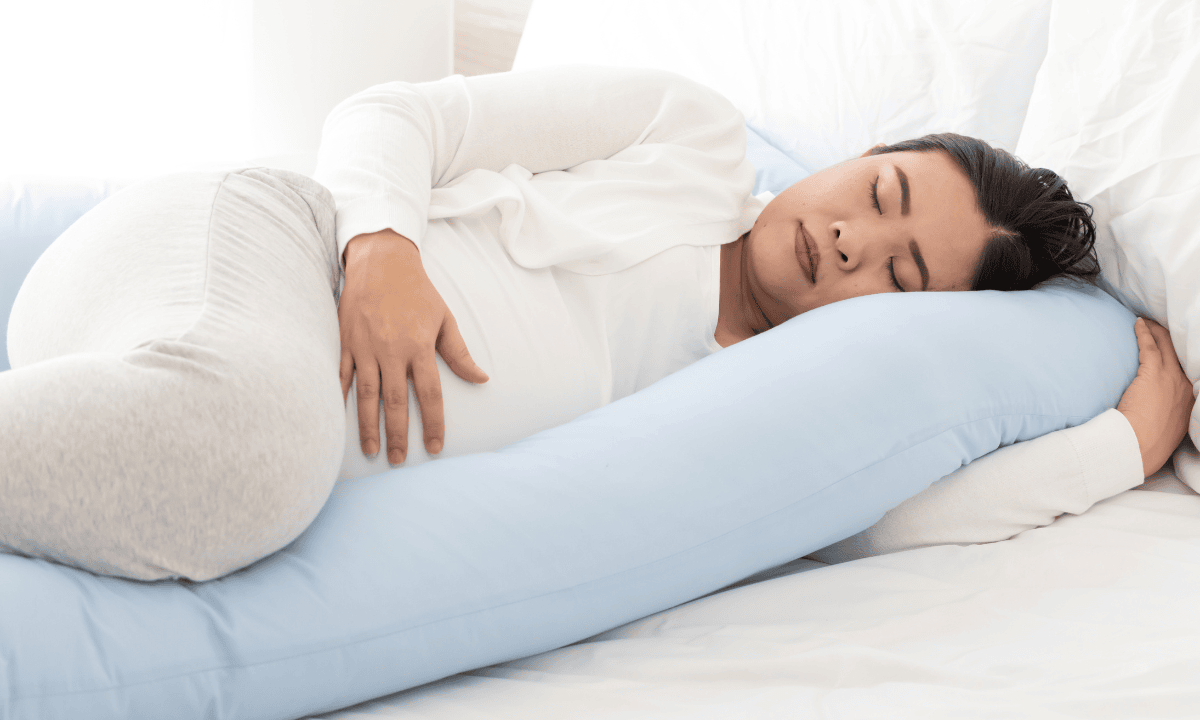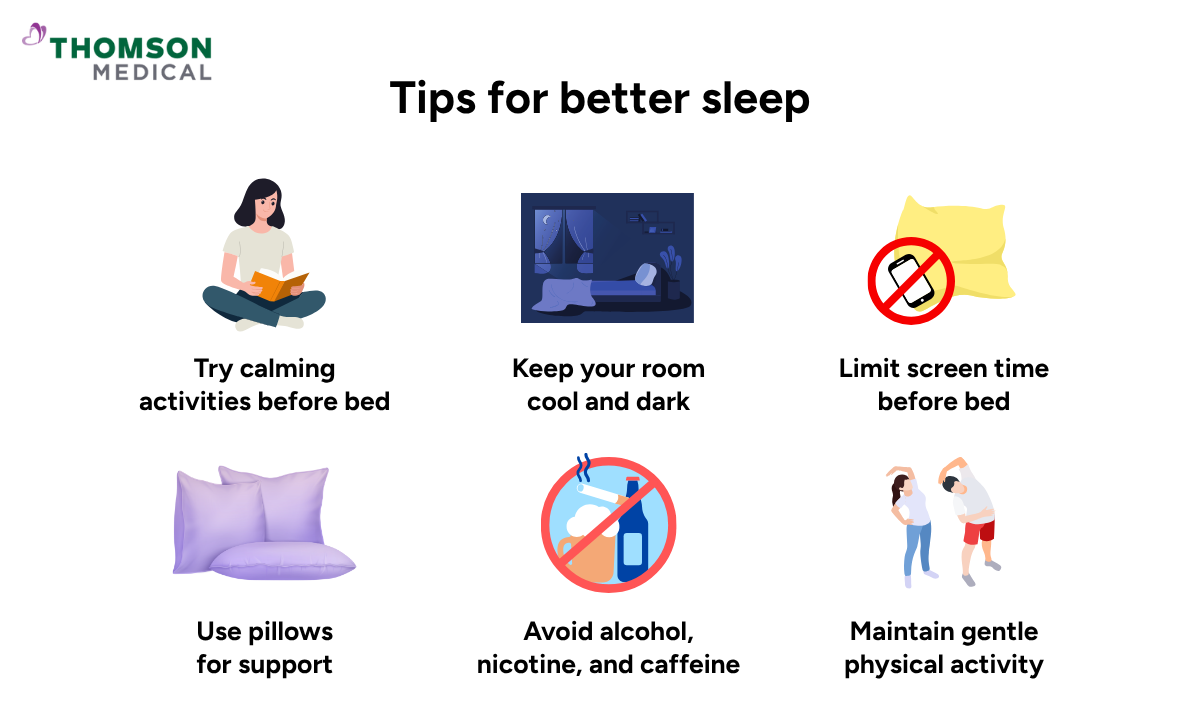After your IUI treatment, you may wonder whether your sleep position could affect your chances of success. It’s understandable that you would be concerned, since you’re hoping for the best outcome from this fertility treatment.
The good news is, sleeping position alone will not determine your outcome, but choosing a comfortable and supportive position can help you rest better and create optimal conditions for your body during the two-week wait after IUI.
What is IUI, and why does post-treatment care matter?
IUI, or Intrauterine Insemination, is a fertility treatment where prepared sperm is placed directly into your uterus (womb) around the time of ovulation. This treatment helps sperm get closer to the egg and boosts your chances of conception.
Taking care of your body during the post-IUI period is important. While there’s no guaranteed formula for success, post-treatment care, such as a healthy diet, lifestyle habits, and how you sleep, can help create optimal conditions for implantation.
Why is sleeping position important after IUI?

While sleeping position doesn’t directly affect implantation or determine success rates, certain positions may provide comfort, uterine blood flow, and hormonal balance better than others. More importantly, your sleep posture can also affect your stress levels, digestion, and rest quality, which are small but can play important roles in fertility.
Implantation usually happens 6-12 days after ovulation, so everything you do during the two-week wait, including how you sleep, can help create a supportive environment for conception.
Best sleeping positions after IUI
Finding a comfortable sleeping position can help you rest better and support your body during this important time. Here are some positions that promote your relaxation, healthy circulation, and reproductive support:
Sleeping on your back (supine position):
This position helps maintain your spine’s natural alignment and reduces pressure on your organs.
It supports your overall blood circulation without compressing your womb.
Sleeping on your back is recommended early in the two-week wait, especially if you find side sleeping uncomfortable or prefer sleeping on your back.
Sleeping on your left side:
Left-side sleeping is also beneficial for your uterine health after IUI. This position helps optimise blood flow to your reproductive organs, which may create better implantation conditions.
You can place a body pillow between your knees to add comfort and improve your spinal alignment.
Semi-reclined or elevated upper body:
These positions can reduce acid reflux and help you breathe easier.
If you experience bloating or mild ovarian stimulation symptoms after your IUI, an inclined position may ease discomfort and help you rest more comfortably. This position can also be helpful if you feel pressure in your abdomen.
You can use an adjustable bed or prop yourself up with supportive pillows to create a gentle incline.
Although certain sleeping positions can help you feel more comfortable during your two-week wait, the effect will vary. If you have questions about your preferred sleeping position or would like personalised post-IUI guidance, schedule an appointment with our specialists at Thomson Medical for tailored advice.
Our IUI specialists in Singapore
Loading...
Sleeping positions to avoid after IUI
After your IUI procedure, some sleeping positions may cause discomfort or not provide the optimal support. The sleep positions you should avoid include:
Sleeping on your stomach:
This position can put pressure on your womb and abdominal area, which may be uncomfortable after IUI, especially if you have had ovarian stimulation. While it will not prevent implantation, it’s better to choose a position that feels more supportive.
Sleeping in a foetal position (tightly curled):
This position can compress your internal organs and limit breathing.
Instead, you should try to keep your body slightly more open, with your spine in a neutral position and your arms and legs relaxed. This helps support better blood flow and keeps you more comfortable through the night.
Tips for better sleep

Getting quality rest during your two-week wait is important for both your physical and emotional well-being. Here are some practical tips to help you sleep better and support your body during this time:
Try calming activities before bed:
Gentle activities like yoga, reading, or guided meditation can reduce your stress hormone levels and improve your rest quality.
Keep your room cool and dark:
A comfortable sleep environment supports hormonal regulation, which is crucial during your fertility journey. Try to keep your room temperature between 15 and 19°C, and use blackout curtains if light affects your sleep.
Limit screen time before bed:
The blue light from your phones, tablets, and computers can affect your melatonin (sleep hormone) production and hormone balance. That’s why it can be helpful to step away from electronic devices at least 30 minutes before bedtime.
Use pillows for support:
Pillow placement can make a difference in making you feel relaxed.
If you are side-sleeping, place a pillow between your knees. However, if you’re sleeping on your back, put it under your knees. It can also be very beneficial for better spinal alignment.
Stay hydrated (but not too close to bedtime):
While drinking enough water during the day supports your well-being, drinking too much water before bed can disrupt your sleep because you may have to use the bathroom more frequently at night.
Avoid alcohol, nicotine, and caffeine:
These substances can disrupt your sleep quality and negatively affect fertility. It’s best to avoid them entirely during your two-week wait and throughout your fertility treatment journey.
Maintain gentle physical activity:
Light activities, such as short walks or gentle stretching, help reduce stress and promote better sleep at night. However, strenuous exercise should be avoided.
Manage stress and anxiety:
The waiting period after IUI can be emotionally challenging. If you’re prone to anxiety, consider managing your stress levels by practising mindfulness exercises, breathing techniques, or gentle stretching to support your sleep.
If you have concerns about post-IUI care or need personalised guidance for your fertility journey, our specialists at Thomson Medical are here to support you. Schedule an appointment today to discuss your specific situation and receive personalised care tailored to your needs.
FAQ
Can sleeping position affect implantation?
There is no scientific evidence to suggest that any specific sleeping position has a direct impact on the implantation rate.
However, supportive positions can help you relax, reduce uterine pressure, and promote healthy blood flow, all of which may create a more favourable environment for implantation.
What is the best position to sleep in after an IUI?
The side-lying position, especially on the left, is often considered the most beneficial for circulation in your womb and organs because it optimises blood flow to your reproductive systems. Lying flat on your back is also safe and supportive.
How much time should I lie down after IUI?
Your doctor may recommend lying down for 10-30 minutes after the procedure. After that, you can resume normal activities unless your doctor advises otherwise. Prolonged bed rest is not necessary and has no positive effect on your chances of pregnancy.
Is it okay to sleep on the stomach after IUI?
Stomach sleeping is not recommended due to comfort reasons. This position can put pressure on your abdomen and may be uncomfortable after hormonal treatments or the IUI procedures. It’s always better to choose a position that supports your body without creating pressure on your abdominal area.
Is there anything else I should avoid during sleep after IUI?
Yes, there are a few things you should keep in mind:
- Avoid heavy meals before bed:
- Eating a large meal before bed can cause discomfort and disrupt your sleep quality.
- Don’t take sleep medications unless approved by your doctor:
- Some sleep aids may not be safe during this time, so always consult your doctor before taking any medication.
- Avoid stress-inducing activities before bedtime:
- Skip activities that might increase anxiety and disrupt your sleep.
- Practise relaxing techniques:
- If you feel anxious during the two-week wait, consider mindfulness or breathing exercises to support restful sleep and emotional well-being.
How quickly can implantation occur after IUI?
Implantation occurs 6-12 days after ovulation. However, everybody is different, and the exact timing can vary. This is why the two-week wait exists. It gives your body enough time for implantation to occur and for pregnancy hormones to become detectable.
The information provided is intended for general guidance only and should not be considered medical advice. For personalised recommendations and tailored advice based on your unique situation, please consult a specialist at Thomson Medical.Schedule an appointmentwith Thomson Medical today.
For more information, contact us:
Thomson Fertility
- Paragon: 6252 7766
Thomson Specialists (Women's Health)
Request an Appointment